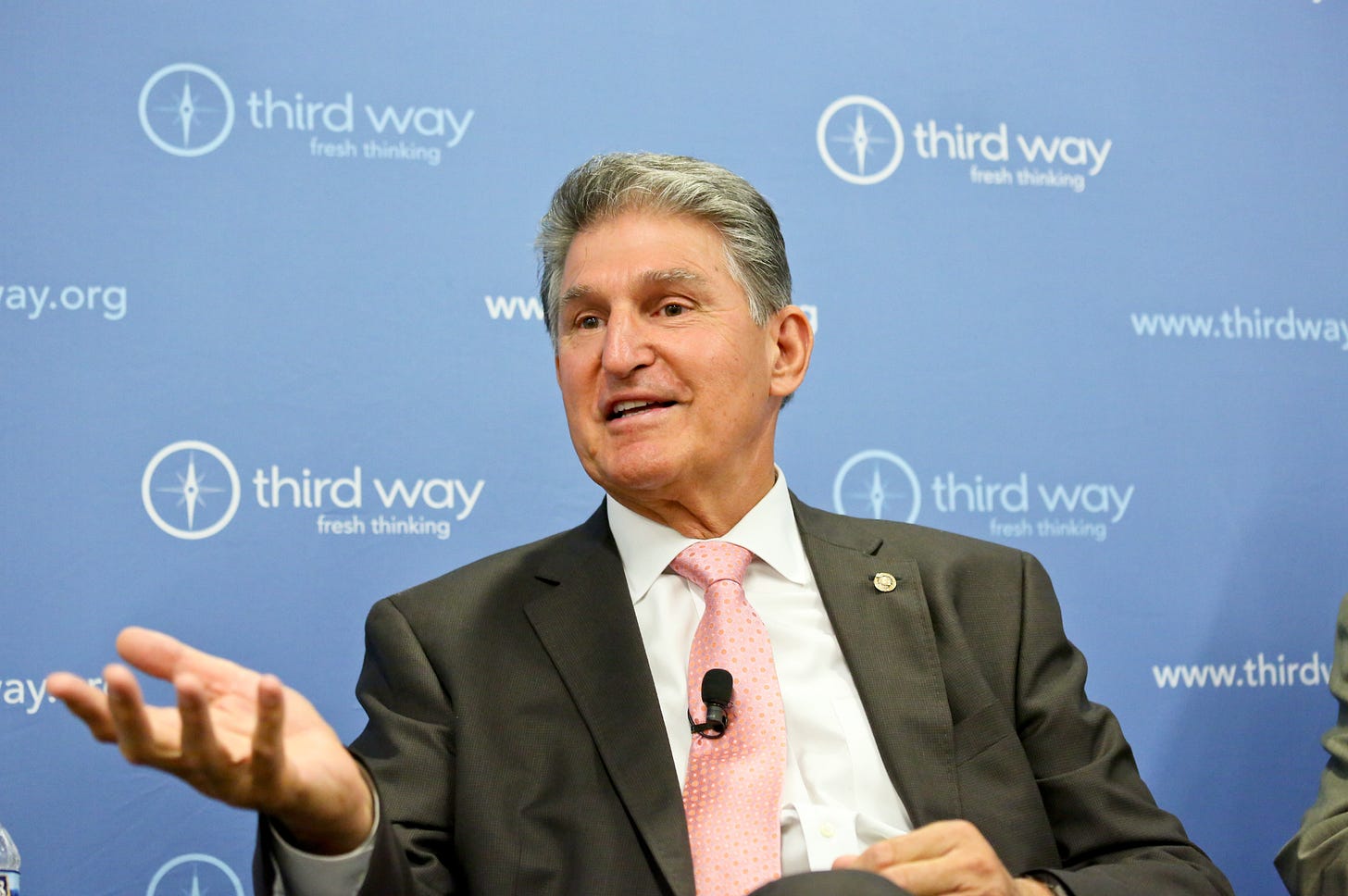After Anti-Trans Military Vote, Sen. Manchin Embraces Project 2025 Policy Targeting All Trans Care
In a troubling new development for transgender people, Senator Manchin appeared to double down on his anti-trans vote to espouse a Project 2025 policy to ban all federal funding for trans care.
Last week, two anti-transgender provisions were quietly added to the National Defense Authorization Act in the Senate. These provisions were included in the “must-pass” budget bill with the help of Senator Joe Manchin, who cast the tie breaking vote to include the provisions in each instance. The bill was then recommended to the full Senate on a 22-3 vote, with many Senate Democrats voting to advance it despite the anti-trans provisions. When asked about the vote by a reporter from The Independent, Senator Manchin expressed confusion about his own vote but then doubled down, expressing support for federal restrictions not just on the military but on all gender-affirming care using funding bills, a major anti-LGBTQ+ Project 2025 policy.
The two provisions in question would use federal funding mechanisms to restrict transgender care for those in the military. One provision would bar the government from paying for transgender surgeries deemed medically necessary for transgender soldiers. Another provision would bar TRICARE, the insurance service for U.S. military service members, from covering any gender-affirming care for those under 18. Both provisions would significantly impact transgender service members and their families, as obtaining care can be difficult for those enrolled in the military without federal support.
Both provisions narrowly passed with a 13-12 vote. Many Democrats on the Senate Armed Services Committee, responsible for the bill, moved it forward despite its anti-trans amendments. Only Democratic Senators Elizabeth Warren and Jack Reed, alongside Republican Senator Tom Cotton, voted against it in the committee. By favorably reporting the bill out of committee, anti-transgender federal funding bans are closer to becoming law than in previous budget battles, where similar provisions were added to House bills but ultimately rejected by the Senate and President Biden.
When asked about his vote by a reporter at The Independent, Manchin initially indicated that it might be a mistake, stating, “I better check on that, huh? Maybe I made a mistake.”
However, a spokesperson followed up not only defending the vote, but espousing a federal funding ban on all gender affirming care, stating, “Senator Manchin believes that Americans who want to serve our country and can meet the standards should have the chance to do so. However, taxpayer dollars should not be used to pay for any services or treatments that are associated with gender transition.”
The statement is a troubling sign for transgender people closely watching federal funding bills. Last year, 50 anti-LGBTQ+ provisions were blocked when Senate Democrats unified against their inclusion, including Senator Manchin, who stated, “Senator Manchin believes service members have earned the right to make medical decisions for their children and families.”
None of the anti-trans funding bans targeting health insurance, healthcare research, the Food and Drug Administration, the Department of Education, and more were passed in the budget showdown. These provisions ranged from sports bans to healthcare funding bans around the provision of gender-affirming care. One bill even aimed to defund children’s research hospitals if they provided gender-affirming care. The impacts of such bills would affect health insurance, hospital systems, and doctors providing transgender care nationwide.
These bills are key components of the anti-LGBTQ+ provisions found in Project 2025, a Heritage Foundation document outlining a new path for the United States. This document aims to empower the executive branch, remove reproductive healthcare rights, and target LGBTQ+ people nationwide. It seeks to institute an analogue to the Hyde Amendment targeting abortion providers, calling for an end to all “public moneys for transgender surgeries,” though many of the funding provisions in recent fights go even further, targeting all transgender care. While often portrayed as a potential consequence of a Donald Trump presidency, these Project 2025 provisions appear to pose a danger even before the election. This is evident in the assent of several Democrats on the committee to the bill, despite knowing it contains such provisions.
The full bill now heads to the Senate, where the amendment process could potentially remove the provision. This would require every Democrat, except Senator Manchin, to vote against the anti-trans “poison pill” amendments. Additionally, other funding bills may become battlegrounds, especially given Manchin’s support for expansive restrictions on federal funding for transgender care. Even if these provisions are defeated, they serve as a stark indicator of the potential future fights for transgender rights in the U.S. post-election



Any trans person in the U.S. that is not gripped with a state of deep worry bordering on alarm right now, it must be because they have their head buried in sand.
The coming months and years are going to be very difficult. We got a clue this was coming when half of the states, in quick succession, banned best-practice GAC for minors in clear opposition to the recommendations of multiple medical organizations.
I just composed and send messages based on your article, Erin, to my two senators. Anyone reading this, please feel free to copy and paste to your own senators:
Please insure that the anti-trans provisions restricting transgender care for those in the military, recently added to the National Defense Authorization Act with help from Senator Manchin, are removed before passing the bill. One provision would bar the government from paying for transgender surgeries deemed medically necessary for transgender soldiers, while the other would bar TRICARE, the insurance service for U.S. military service members, from covering any gender-affirming care for those under 18. Both provisions would significantly impact transgender service members and their families, as obtaining care can be difficult for those enrolled in the military without federal support.